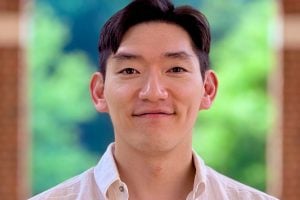
Sangkyun Cho, Engr’13, joined the Department of Chemical and Biomolecular Engineering as an assistant professor on August 1, returning to the department where his scientific journey began.
“I completed my undergraduate studies in ChemBE here at Johns Hopkins, so this is a homecoming,” said Cho, who is a core faculty member at the Whiting School of Engineering’s Institute for NanoBioTechnology. “Returning to Johns Hopkins, where I first learned how to hold a pipette, feels like coming full circle.”
Cho’s research combines biology, engineering, and data science to better understand and treat fibrosis, a major driver of pathology and aging of nearly all of our solid organs. His lab is particularly interested in the development of new precision therapies against fibrosis-associated conditions, including cardiovascular disease and cancer.
“I was inspired early on as an undergraduate student by the idea that mechanical signals—something as fundamental as stiffness or stretch—could profoundly alter cell fate, drive pathology, and potentially be harnessed to promote healing and regeneration,” said Cho.
His interests have since expanded to include bioinformatics and cardiovascular physiology, along with a broader focus on understanding and engineering the complex microenvironments that regulate tissue health and disease.
“A common underlying theme in my research is understanding how our cells interact with each other and with their complex physical microenvironment,” said Cho.
In a recent study published in Nature, he led a team that developed a dual “mechanotherapy” to combat heart failure and fibrosis. At Johns Hopkins, Cho’s lab will investigate how mechanical forces and chemical signals work together to control how fibroblasts—cells that help build and repair tissue—change their behavior and develop into different specialized types. He will explore how these processes differ between females and males across various diseases, as well as how cells communicate with each other during scarring and tissue regeneration.
After earning his bachelor’s degree at Johns Hopkins, Cho pursued a PhD with Dennis Discher at the University of Pennsylvania, where he explored how cells— specifically, their nuclei, sense and respond to mechanical stress. Cho completed postdoctoral training under Joseph Wu at Stanford University School of Medicine, focusing on cardiovascular fibrosis, single-cell genomics, and stem cell-based tissue engineering.
“Professionally, I was drawn back to Hopkins’ ChemBE because of its strong interdisciplinary culture, its leadership in bioengineering, and the exciting opportunities to collaborate across engineering, medicine, and the life sciences,” said Cho.
He said he is looking forward to building his lab “from the ground up—bringing together a diverse group of students and postdocs, establishing new collaborations across Hopkins, and launching our first set of projects. The department provided me with so many opportunities that were foundational to my career, and I look forward to giving back through service, mentorship, and teaching.”
Outside the lab, Cho enjoys running, basketball, and experimenting with fermentation.
“Lately, I’ve gotten into fermenting different foods at home, like pickles, sauerkraut, and kimchi, which I am finding is a very productive and enjoyable activity, especially for a chemical engineer,” he said.